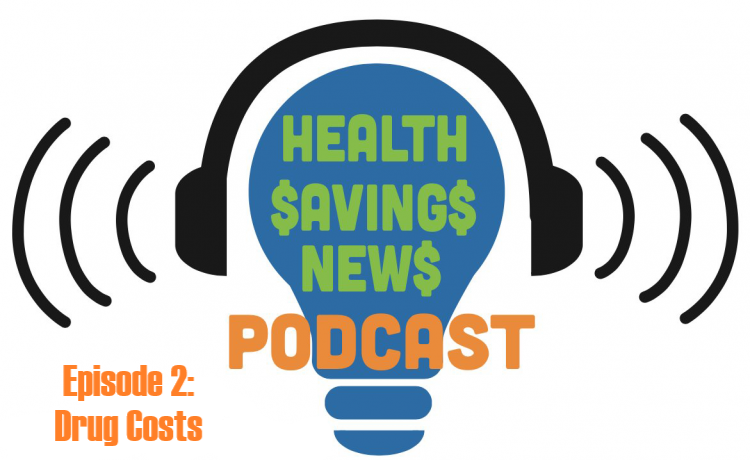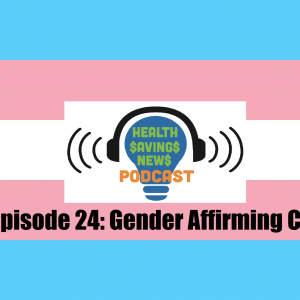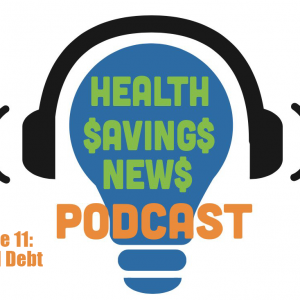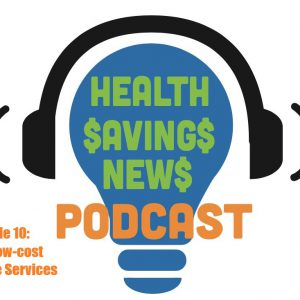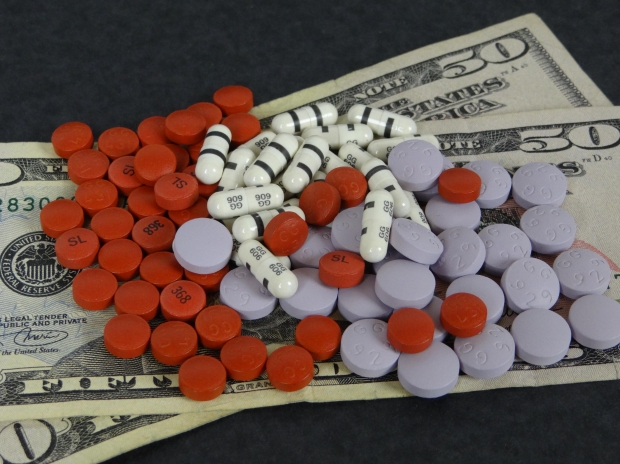This a transcript to episode 2 of Health Savings News. In the interest of making the podcast more accessible, we will post transcripts every two weeks as episodes release.
Evan (00:09):
Hello, and welcome to Health Savings News, the podcast about healthcare savings in America and how to save money on the often expensive care all kinds of people need. I’m your host, Evan O’Connor, joined by retired doctors, Rich Sagall and Mike Woods. How’s it going guys?
Rich/Mike (00:23):
Good.
Evan (00:25):
Great. Each episode we discuss healthcare costs in America, offer tips for saving money and relevant news that affects and reflects the expense landscape of healthcare in the United States. Today’s topic is prescription costs. The United States does not regulate or negotiate the price of prescription drugs. Pharmaceutical companies are allowed to set their own prices for any given product, leading to excessive drug prices being the single largest area of healthcare overspending in the U.S. Many drugs cost over $120,000 per year. A few drugs even approach a million dollars annually. The Department of Health and Human Services estimates that Americans spend more than $460 billion in medications each year. The high cost of drugs can lead to poor adherence: skipping doses, not taking medicine as directed or going completely without prescribed medications. This practice can make chronic conditions worsen and could lead to more complicated or expensive treatments being necessary. Medication nonadherence leads to an estimated 125,000 deaths in the United States per year. Drug prices are a public health issue when it comes to preventing people from receiving the care they need. We all do work at NeedyMeds, which has a lot to do with people affording their medications. So I know Mike and Rich have a lot to say on the topic.
Mike (01:39):
Yeah. My biggest concern is that there are very definitely high risk groups where this effect is very much greater as a pediatrician. My biggest concern it’s about those families with low incomes that have children with chronic illnesses who can’t afford the medications to keep their children well.
Rich (02:03):
One of the real shames is the shortsightedness of people not being able to afford their medicines and the cost it brings to the healthcare system. It’s a lot cheaper to help people afford the medicines they need than let them deteriorate physically and have to be hospitalized.
Mike (02:18):
Not only is it tragic for the health of the children involved, but it also adds much expense to the whole cost of medical care when they end up in emergency rooms or being hospitalized rather than the prevention of serious illness that comes about from being compliant to your medications, when you can afford them.
Rich (02:41):
And that doesn’t happen just with children and happens with many, many adults who can make the decisions — those tough decisions, whether they’re gonna buy their medicine or put food on the table,
Mike (02:52):
Especially the elderly who are on a fixed income.
Rich (02:55):
That’s true.
Evan (02:56):
Inequities affect everybody, for sure. There are people who are unable to work because of chronic conditions and health insurance is often tied to employment. If you don’t have access to employment, there’s a lot of people who just don’t have access to affordable healthcare coverage. Unfortunately, even having insurance is no guarantee you’ll be able to afford your prescriptions. According to a 2020 poll from NPR, despite the majority of Americans having health insurance that includes prescription drug coverage, more than one third of adults across all income groups say that they or a household member were told by their health insurance that their plan would not cover a drug prescribed by their doctor. If patients are low income — earning less than $35,000 per year — they would likely not fill the prescription. Even if patients make up to $99,000 per year, 48% of them do not pick up prescribed medication when it’s not covered by their insurance. Such denials can be appealed and overturned, but the process is often so arduous and steeped in administrative bureaucracy that many people — especially those who are already struggling — are likely to become exhausted and give up. Even the option to appeal can be obscured from patients who are already overwhelmed with illness and finances.
Rich (04:08):
As one on Medicare, we just get overwhelmed with paperwork and you just begin to say the hell it, I’m not gonna look at it anymore. Every, every day there seems to be a letter or two in the mailbox for Medicare.
Evan (04:22):
Yeah, for sure. Getting a little personal, my mom was diagnosed with cancer in 2019. She’s been trying to get talk through social services and Medicare stuff. And they’re like, “oh, we need, we need the dates of every blood test you’ve had in the past year.” Well, that’s like 30 dates. She has to remember which dates were when she had the blood draws and where she got the test results. It’s just so much information that most people, even I, who hasn’t had– I can tell you the number of blood tests I’ve had in the past year. It’s not many, but I couldn’t tell you what the dates were off the top of my head.
Mike (05:01):
Yeah. Not to mention what you have to pay the person to go over all those dates to prove the medication.
Rich (05:08):
Well, let’s talk about some things that individuals can do to help lower their healthcare costs. One of ’em as we alluded to is the cost of medications. Now, there is a big difference between those that have insurance and those that are cash paying. One of the suggestions that I have is if you’re cash paying for the drug, or you have a high deductible, you may wanna shop around. I’ve seen price differentials from drugstore to drugstore be hundreds of dollars for the same drug. There’s no rhyme or reason why one drug is more expensive in one drug store. Any different drug may be more expensive in a different drug store. The problems are multiple for shopping around, however. One is that you don’t get the benefit of a pharmacist who knows all the medications you are on to make sure that there are no interactions or other problems taking multiple drugs. And that’s a big problem. Doing this is a lot of work. You may have to shop around to different drug stores to get different drugs and prices may vary. So one month drug store A may be cheapest, the next month drug store B. So that’s just one idea in terms of looking for medications.
Mike (06:14):
On the bright side, organizations like ours, NeedyMeds, actually maintains databases for you to check this information. In most cases, the information is available down to specific drugs, including by geographic locations that will allow you to do this in an easier manner.
Rich (06:37):
And that you can find with the pricing for a drug discount card.
Evan (06:41):
Yep. The NeedyMeds has a drug discount card that can save up to 80% off the cash price of drugs. As you said, the NeedyMeds website does have a calculator that tells you how much the price would be with the card at certain pharmacies. The price can change every day. NeedyMeds also has information on pharmaceutical patient assistance programs that can provide medication at low or no cost for patients that qualify. NeedyMeds also has information on rebates and coupons.
Rich (07:09):
We also have information on programs that help people pay for their medicines. And these are all listed under the diagnosis based assistance section of the website.
Mike (07:18):
Yeah. For those of you who actually have health insurance, there are two of very important things to keep in mind that you can do to keep your drug costs down. The most important is to choose generic brands whenever you can over brand names. And the second is it is vital to know the terms of your insurance so that you can avoid the excessive costs of medications that are either not in the insurance formulary or avoiding drugs without getting prior authorizations.
Rich (08:01):
Other tips for medications besides shopping around is using drug discount cards. Now, as I mentioned, NeedyMeds has one, but there are many, many different drug cards out there. One important thing to remember is no drug discount card gives the best price all the time. The prices vary. It’s a very complex situation, which we will not bore you with, but the bottom line is you can’t count on any card to give you the best price, but they may save you a lot of money. You can combine them with insurance or state or federal programs, but sometimes they give a better price than the copay. So it’s worth checking.
Mike (08:38):
For those of you who are looking to save money on medications, the process starts actually with speaking to your physician. Unfortunately a lot of physicians aren’t as knowledgeable about generics and the terms of your insurance to help you as much as they can, but it is still important to speak to them about it. One of the most important things to talk to your doctor about is any financial constraints you have that may actually make it necessary for you to find cheaper options, probably the most important of these is to try and choose generic drugs whenever possible over brand name drugs. In the past, having generic drugs may have been a problem because of the quality issues associated with various pharmaceutical companies making drugs. However at this point in time, there are a lot of standards in place that dramatically reduce the risk of significant variation between different brand name drugs. As a personal example, I’ve been on levothyroxin now for approximately 25 years. When I first started being on the medication, every time that I switched to a new generic drug my levels would have to be checked because of the variation in availability of the drug in the pill. Over the past decade or so, the quality standards have improved to the point where I can freely switch between different generic brands without having to worry about fluctuations in my levothyroxin levels. There are also many generics that have been studied by the drug companies, making them that have shown that they are in fact equivalent to branding. The biggest problem when using generic drugs comes from getting the drugs from non-reportable sources, such as mail away pharmacies or other non-regulated sources of the medication. A lot of these medications can either be less potent, have no active ingredient at all, or even have harmful ingredients. So make sure that you do your research when it comes to buying medications online or through mail-in pharmacies.
Rich (11:15):
To add to that. I think if the mail-in pharmacy is located in this country, you’re pretty safe, but if it’s located outside of the country, you really don’t know the quality of the product you’re getting. Now, people talk about Canadian drugs. I think if you go up to Canada and into a drug store, a brick and mortar store as we say, that’s fine, but any sort of mail order, you never know where the drug is really coming from. You may get a good medicine or you may get something that’s contaminated as Mike just mentioned.
Evan (11:44):
Yeah. It’s really important when you’re ordering drugs online to know where they’re coming from. New websites do have the .pharmacy suffix instead of .com or .org. Those tend to be reputable. Also look for the Verified Internet Pharmacy Practice Sites seal just to make sure that it’s absolutely credible.
Mike (12:09):
As a corollary to generic drugs, another important method of avoiding expensive drugs is to try to stay away from the newest, latest and greatest medication when it really offers no significant advantage over a generic brand or has not definitely been shown to work. As a recent example is the Alzheimer’s drug that was touted as a significant breakthrough for Alzheimer’s disease. When finally looked at in detail, it turned out that there was really no evidence that it worked at all, and it’s now probably gonna be taken off the market for now until they accumulate more evidence. One of the things as a physician that we would see with brand names in these new, latest-and-greatest is the fact that most of the impetus for using or asking for these drugs comes from direct-to-consumer advertising before consumer advertising became an issue. This was not as much a problem since most of our patients would more easily accept the choice that the physician makes for treating their medication. But now armed with all this blown up information from the pharmaceutical companies in their advertising, patients are now aggressively asking for all of these new drugs that are now coming on the market. As a matter of fact, even the providers get pressure from the drug companies when the drug representatives come to our office and some cases put so much pressure on us that in a few cases, I felt like it was malpractice not to use their drug because they were so aggressive about about selling it.
Evan (14:11):
Yeah, the United States and New Zealand are the only two countries that allow direct-to-consumer advertisements for pharmaceutical products or for prescription medications. Most countries that have ads, you can get over-the-counter drugs advertised to you, but prescription medication ads are only in the United States and New Zealand, which is pretty noteworthy. The United States spends about twice what other high income nations due on healthcare, but has the lowest life expectancy and the highest infant mortality rates among peer countries. Americans pay more for worse health outcomes. Despite using roughly the same amount of health services as people in other affluent nations, prices are steeper for drugs, medical devices, and administrative costs to process insurance claims and other hospital bureaucratic business.
Mike (15:02):
Unfortunately some recommendations from experts come from those with financial interest in the products that they recommend. One of the ones I can think of is monoclonal antibodies for ulcerative colitis. The standard of care before monoclonal antibodies was methotrexate, which works fine for most folks with ulcerative colitis, however, a guideline committee made monoclonal antibodies the first treatment of choice for Crohn’s disease. And it turns out that the person who made that recommendation in the guideline had financial interest in the company that makes the monoclonal antibody for ulcerative colitis.
Evan (15:52):
That is a topic we could definitely get far into especially in regards to things like the COVID-19 pandemic. There’s a lot of treatments being touted where even the approved treatments aren’t as effective at treating it as the vaccines are preventing it. But again, that is a whole other discussion for probably a different episode.
Mike (16:17):
Okay. So, you know, maybe just a synopsis of what that means, but instead of having patients influenced by advertising guidelines are influenced by pharmaceutical companies indirectly through the doctors making them. One of the other corollaries that I know Richard likes to talk about when it comes to treatment is something called stepwise treatment, which is a really time honored method of treating different illnesses.
Rich (16:51):
I agree. I think it’s important for patients to understand that and why doctors do it. And with a stepwise treatment, you start with the oldest, generally the oldest effective drug, usually less expensive, better known. We understand the side effects and complications of it. And if that doesn’t work, then you move up to another step, which might be a more expensive drug, a more complicated drug that does different things, different approach to the problem. And you keep stepping up and you may end up on the most expensive drug because you’ve tried the others and they don’t work.
Mike (17:24):
From an insurance point of view that is often a necessary step in order to get a certain drug approved. So we had mentioned prior authorization previously but in a lot of cases that amounts to exactly what was just described. You need to try some time honored medications before your insurance company will authorize the use of a more expensive medication.
Evan (17:51):
Drug prices in the U.S. are more than two and a half times higher than other countries contributing up to 75% of the pharmaceutical industry’s profits. Despite claims reducing pharmaceutical company profits would reduce innovation, the pricing of drugs bears no relationship to cost of development and manufacture, the drugs effectiveness, or the extent to which public funds were used in its development. In fact, U.S. tax dollars funded every new drug approved by the FDA between 2010 and 2019 during which time pharmaceutical profits have exploded.
Mike (18:26):
I just wanna briefly discuss the other aspect of reducing costs on medication. And that is buying too much of it or requesting or using a medication when it’s not necessary. There’s really two aspects to that. One is prescription medication and the other would be over the counter medications. Both patients and physicians are responsible for what we would call over-prescribing medications. This includes a number of things, including prescription for illnesses that don’t need them such as be antibiotics for viral infections, giving too many pills per prescription, which is especially a problem with narcotics since most of us really don’t need two weeks of opioids for a surgery whose pain is gonna last about one to two days before it becomes I amenable to Tylenol. Automatic refills can be another problem that doctors sometimes use so people won’t have to call their office on a regular basis to get the refills, but don’t take into account that that medication may not need to be refilled. Unused medication accumulates around the house. In some cases with opioids, it’s actually quite dangerous. Other times you can take medications for longer than needed. For instance, we used to think that all infections needed to be retreated with two weeks of antibiotics. Now we know that that is far from true and some infections now, including urinary tract infections can be treated with a one or two doses of antibiotics.
Rich (20:21):
I think it’s also important to consider why you’re taking the medication. Is it just to lessen the symptoms like a runny nose, or is it more curative like an antibiotic sometimes is. So that’s one thing to keep in mind. The second is not to have unrealistic expectations of the medicine. Pain pills are not gonna take care of your pain and totally take it away. They may take the edge off it and make things more tolerable, but expecting total resolution is in most cases unrealistic. So you wanna keep that in mind whether you really need the medicine or not.
Mike (20:56):
Yeah, I think the biggest problem there is not the prescription medications as it is of over the counter drug uses. When it comes to over the counter medications, there are so many of them, especially cold remedies, vitamins, and natural and alternative products that really don’t work and people are spending millions and millions of dollars on these products. Another situation with over the counter that Rich has described in the past is that there are now more potent medications available over the counter, such as high potency steroid creams, or steroid nasal sprays that actually are more expensive over the counter than they would be if you got a prescription for your doctor for the same medication.
Rich (21:49):
And along the same line, sometimes combination medicines of two drugs or more are more convenient to take, but they’re more expensive and you can save money by going and taking each drug independently. It’s something you need to talk to your doctor to a pharmacist about.
Mike (22:07):
Yeah. Especially with this being a common ploy that pharmaceutical companies use to be able to keep a patent on their medication where they just mix two generic medications together call it a new brand name and voila: they’ve got themselves brand name that they have a patent on for. What did you say? 20 years?
Evan (22:35):
Yeah. So pharmaceutical patents, I don’t know if it’s all patents, but patents in the United States allow the original creator something like 20 year exclusivity rights. Re-patenting can come in the form that you just said, where they just tweak the drug a little bit, add some acetaminophen to it, and now it’s a whole new drug that they can again, have exclusive rights to distribute and make for 20 years. There’s also another re-patenting that pharmaceutical companies can appeal to a court, for lack of a better term, and they can be given an extra 20 years. So it can be like 40 years of important medications having only one source that you know, that can be a monopoly in certain instances. Right? So to recap some tips on saving on your prescription costs: go with generic medications when they’re available and appropriate, look up patient assistance programs that could provide medication at low or no cost for patients that qualify, there are rebates and coupons, there are drug discount cards like needy meds card or whatever card gets you the best price and also shop around which isn’t super convenient, isn’t the most accessible to people in certain areas or with certain conditions, but it can save you some money month to month, for sure. You can ask your pharmacist or doctor about any of these, or you can check before going to the pharmacy at needymeds.org.
Mike (24:05):
In whatever medication you want to be taking, make sure you actually need it before you either request or purchase it.
Evan (24:20):
The last segment of each episode, we suggest some of the culture, art, entertainment, and social causes we’ve been engaged with to each other and to our listeners.
Rich (24:27):
This episode, I’d like to talk about one of my favorite podcasts called More or Less. This is from the BBC. And they come out with weekly podcasts, looking at the statistics in the news and analyzing them. A recent episode had three different healthcare topics that I’d like to touch on just briefly, to give you an idea of what they discussed. One of ’em looked at the reported desk from COVID in great Britain. Some of the experts say at 17,000, well, others say 170,000, and they talked about how can there be two such divergent numbers, both coming from re reputable sources. And what they discovered is the 17,000 were death certificates where COVID was the only listed cause of death while the 170,000 were death certificates that mention COVID, but there other causes or other illnesses present also. Another thing they looked at is the five second rule. We all heard that when we were kids, you drop food on the floor, if you pick it up within five seconds, it’s okay to eat. What they discovered is that doesn’t really apply. It depends upon the food, how long it’s in contact and the surface that it’s in contact with and what sort of bacteria around there. The third topic they had was an interesting study of placebos and the placebo effect, which is something we’ll talk about in detail later on in another podcast. But what they found is the placebo effect is becoming more prominent in America, but not in most other countries. And the reason they think that’s true is because in America, we have those ads on TV. We show you take a drug and you become young, healthy, physically active and mentally sharp. And so people have higher expectations of their drugs and experience more placebo effect than people in other countries where they don’t see the ads. And therefore don’t have these higher expectations. Again, the podcast is More or Less from the BBC and you can find it on any of your podcast aggregators. I highly recommend it.
Evan (26:34):
Great. I also have a show I’d recommend: Adam Ruins Everything. It aired on TruTV from 2015 to 2019. It’s currently streaming on HBO Max and had a comedian named Adam Conover give you unspoken truths about everyday things. Some episodes I would suggest would be one on drugs, which again, we just talked about drug care drug costs. It has a lot to do with how a lot of things that would be considered dangerous street drugs are identical to things that people spend a lot of money on for their healthcare. There’s also a great episode on hospitals that gets very far into why hospitals cost as much as they do. They talk about things like the charge master and how a lot of the prices that hospitals and insurance companies land on are really kind of arbitrary. Like I said, that ran from 2015 and 2019. Adam Conover now has a podcast Factually where it’s essentially the same show where he interviews experts about the uncommonly spoken truths about their field of expertise. The great episodes I’ve listened to recently were on women’s health and how misogyny plays a role in their care. There was one on medical myths. There was a great one on medical debt — I’m sure I’ll talk about their organization that was referenced in that episode at some point, but yeah, it’s a great show. It’s a good podcast that has a lot of information that is compelling, but you wouldn’t necessarily have known if you hadn’t learned it previously.
Thank you all so much for listening to this episode of Health Savings News. Please subscribe, rate, and review us on iTunes. Wherever you’re listening to the show, it really does help. You can follow @NeedyMeds on Twitter, Facebook, Instagram, LinkedIn, YouTube. You can follow @HealthSavingPod (no S at the end of savings) on Twitter for updates specific to this podcast and send questions, comments, and topic suggestions to podcast@needymeds.org. Our music is composed by Samuel Ruan Miller. His music can be found at musicisadirtyword.bandcamp.com. All of the sources we use in our research can be found at this episode’s podcast transcription on the website or on your podcast app of choice. Health Savings News is not intended to substitute for professional medical, financial or legal advice. Always seek the advice of a qualified healthcare professional or appropriate professional with any questions, views expressed and health savings news are solely those of the individual expressing them. Any views expressed do not necessarily represent the views of Health Savings News, other contributors, the NeedyMeds organization, or staff. Thanks for listening. See you in two weeks with our next episode.
Sources:
https://www.turningclockback.com/save-money-at-the-pharmacy/
https://www.verywellhealth.com/drug-formulary-tiers-pricing-health-insurance-plans-2615042
https://pubmed.ncbi.nlm.nih.gov/35060618/
https://considerable.com/5-pharmacist-questions/
https://nabp.pharmacy/programs/vipps/vipps-accredited-pharmacies-list/
https://www.consumerreports.org/drug-prices/shop-around-for-better-drug-prices/
https://www.needymeds.org/

